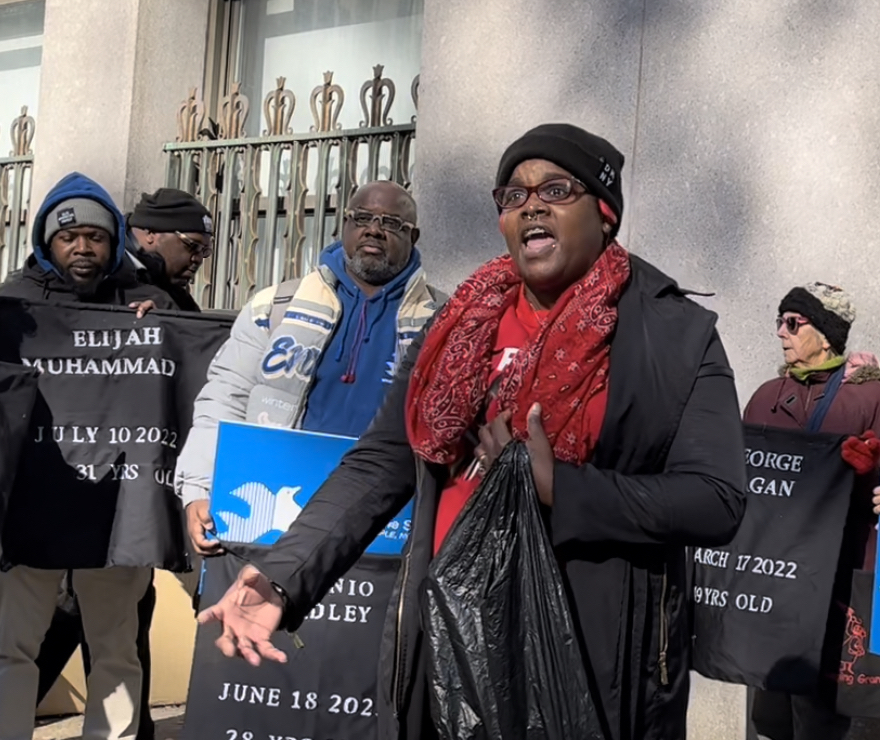Remember the toilet paper panic at the start of the pandemic – the fear of going weeks without T. P.? Think about life without sanitary napkins, soap or even basic toiletries.
This is the reality for hundreds of women incarcerated at the Rose M. Singer unit, the women’s jail on Rikers island, commonly known as Rosies.
At a recent monthly meeting of the NYC Department of Correction, former detainees spoke out about ongoing prison conditions and described weeks-long shortages of basic hygiene supplies.
“You need sanitary napkins,” said Candy Haley, who had been held in solitary confinement at Rikers for three years. “Imagine an officer denies you sanitary napkins and you’re bleeding on yourself. That’s inhumane.”
Commissioner Louis Molina and his staff left the meeting just before the public comments period began.
“It is very hard to maintain, to be healthy when I can’t brush my teeth,” said another inmate, in comments pre-recorded at the jail. “We lack soap and I am becoming sick.”
The upset escalated when the Rosies commissary, which inmates rely on for basic needs such as food and hygiene supplies, was closed for two weeks in November.
Family members and friends of former and incarcerated Rikers Island detainees spoke out at the board’s meeting at 125 Worth St. in Lower Manhattan.
In tearful testimony, Cynthia Acevedo remembered her younger brother, Gregory Acevedo, 48, of Harlem, who drowned in September after trying to escape from the Vernon C. Bain Center, “the floating jail” off the tip of Hunts Point. Acevedo had been awaiting a court appearance on a robbery charge. A medical examiner’s report cited accidental drowning as the cause of death.
“The Department of Corrections must become proactive when dealing with the safety of people in their custody,’’ said Acevedo. “People in DOC custody should not be sentenced to death. Staff are negligent because there is no accountability.” She said Mayor Eric Adams and Molina need to take action to avert further deaths.
In November, Judge Laura Swain asked Molina about the lack of hygiene supplies, which had been cited in a report of the federal monitor appointed to oversee Rikers. Molina said these items had not arrived at the prison because of “supply chain issues.’’ In July, the U.S. Department of Justice released the female offender manual that promises to provide feminine hygiene items for all inmates.
At the meeting Michelle Feldman with the Women’s Community Justice Association advocated reducing the number of women at Rosies from 325 to 100. Instead of jail time, the association asks that mental health support services such as counselors and transitional housing be made available.
Feldman said the Department of Corrections needs to “conduct holistic needs assessment for mental illness, domestic violence, and other factors at every stage of the case ensuring treatment.”
A petition with 374 signers, #beyondRosies, sent to the mayor and Gov. Kathy Hochul demands a reduction in detainees at Rosies and an improvement in safety and treatment for all those held at the women’s prison.
Last year, Hochul announced that women and gender expansive people would be moved to a “safer” state facility. The majority of women at Rosies are awaiting trial but were moved to Bedford Hills correctional facility in upstate. After a few months, they were moved back to Rosies, with no improvement in conditions even as the population rose, according to the Women’s Community Justice Association.
Of the women held at Rikers, 93% are survivors of domestic violence, and 70% are the primary caregivers for their families, the women prisoners advocacy group said..
“Please let more mothers, daughters and sisters spend the holidays where they belong,” said Feldman in concluding her presentation to the corrections board.

